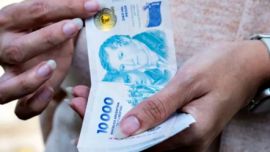THE WEEK IN CORONAVIRUS
With the daily caseload in the second wave of the pandemic regularly topping the 20,000 mark there were 2,497,881 confirmed cases of coronavirus and 57,350 deaths at press time yesterday as against 2,373,153 cases and 56,023 deaths the previous Friday. Right at the outset of the Easter weekend there was dramatic news on this front with President Alberto Fernández testing positive despite having received both Sputnik V vaccinations, apparently missing over- lap with his 62nd birthday by minutes (some Saturday newspapers carried the news). As from Tuesday the pandemic commanded the main headlines in news- papers throughout the week. In midweek after hectic negotiations as to how drastic a crackdown to make on nightlife (with the most resistance coming from City Hall), President Fernández finally announced various restrictions including a total ban on social meetings in private homes and on casinos, the cancellation of all group tourism and a virtual curfew from midnight to 6am, preceded by res- taurants and bars shutting their doors by 11pm. Open-air social activities were capped at 20 people and indoor sports at 10. Various other restrictions (includ- ing the key area of public transport) were left at the discretion of local governments. Fernández further reported that the number of districts reaching red alert criteria had almost doubled from 48 to 87 housing almost 26 million people. Thursday saw a huge picket protest defying the new restrictions and federal security forces started to be deployed to boost the policing of the new measures. Early polls showed around 60 percent of public opinion as supporting the new measures.
INCOME TAX REFORM
The Senate on Thursday gave final approval to the bill raising the income tax floor to a gross salary of 150,000 pesos, thus benefitting almost 1.5 million workers and 400,000 pensioners, with 66 of the 72 Senators voting in favour and a single abstention – Esteban Bullrich (PRO-Buenos Aires Province). Despite this unanimity, Vice-President Cristina Fernández de Kirchner chairing the ses- sion was harshly critical of opposition senators, accusing them of behaving like “horrible hooligans” in their responses to criticisms of ex-president Mauricio Macri. Labour Committee Chairman Daniel Lovera (Frente de Todos-La Pampa) pointed out that only seven percent of workers and 2.4 percent of pensioners would now be paying income tax while Laura Rodríguez Machado (PRO-Córdoba) retorted that while the govern- ment had lowered one tax, they had no programme for lowering the tax burden as a whole, as the Macri presidency had achieved. In related news, AFIP tax bureau announced on Monday that last month’s revenue intake had topped the previous March (the first month of quarantine) by 72.2 percent..
MARKET WATCH
The main parallel exchange rate, the “blue dollar,” continued this year’s stable levels last week, closing at 140 pesos, well behind the official exchange rate of 98 pesos as quoted by Banco Nación if the 65 percent surcharges for purchasers are added. Among the unofficial but legal alternative exchange rates the CCL (con- tado con liquidación) closed yesterday on the rise at 149.86 pesos while the MEP (mercado electrónico de pagos) moved down to 144.38 pesos. Earlier in the day country risk was 1,609 points with no closing figure available at press time.
MALVINAS DISPUTE
The government on Wednesday complained to Uruguay over having permitted a British military aircraft en route to Malvinas to be supplied in Mon- tevideo, thus contradicting the policies of cooperation between Argentina and Uruguay. Even if there is formal treaty to that effect, Uruguay has historically backed Argentina’s sovereignty claims, both as a nation and as a member of the Mercosur trade bloc. Early in the Frente de Todos administration Argentina com- plained about 13 military flights to the Malvinas from Uruguay in the course of the year 2019. This protest comes less than a fortnight after tension between the two countries at the Mercosur summit following Uruguayan President Luis Lacalle Pou’s bid for more flexible norms for the regional trade bloc.
TORTURE RULING
The Federal Appeals Court of Comodoro Rivadavia on Wednesday confirmed the trials of four military officers accused of savage tortures of soldiers under their command in the 1982 South Atlantic war. A total of 18 episodes under investigation, including staking out privates under enemy fire, had caused the death of two soldiers and blinded others. The officers were also accused of malnourishing their men and then pun- ishing them for stealing food. Two of the court’s three judges voted for the trials to proceed but Hebe Corchuelo rejected defining the tortures as crimes against humanity whereby they qualified for the statute of limitations..
SOUTHERN COMMANDER VISITS THE SOUTH
Defence Minister Agustín Rossi yesterday hosted the Pentagon’s Southern Command chief Admiral Craig Faller at a 45-minute meeting with regional strategy, a donation of US$3.5 million for field hospitals against the Covid-19 pandemic and a protest against the British veto of arms sales to Argentina topping the agenda. The meeting was the central part of Faller’s two-day visit to Argentina.
MEXICO, ARGENTINA URGE DEBT RELIEF
Mexico and Argentina on Wednesday called for international debt relief for middle-income countries home to many of the people pushed into extreme poverty by the coronavirus pandemic. The nations said that middle-income countries have been forgotten – squeezed between the extremes of nations able to provide monetary stimulus through zero or negative interest rates, and the poorest nations that have benefitted from the G20’s Debt Service Suspension Initiative.
WEALTH TAX NOT RAKING IT IN YET
Argentina’s new wealth tax has netted just two percent of its target figure ahead of its original deadline, with the nation’s richest citizens evidently in no hurry to pay up. The government collected only 6.063 billion pesos (US$66 million) from its one-off “extraordinary contribution” in the course of March, a communiqué reported on Monday night (not including advance payments of 504 million pesos). Although Argentina’s richest individuals now have until April 16 to pay the tax – after authorities extended the original March 30 deadline – the intake thus far has been well below the projected target of 300 billion pesos when Congress approved the bill late last year.






















Comments